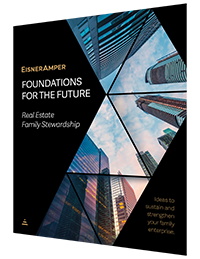
Part 1: The Real Estate Family’s Considerations for Success
- Published
- Sep 15, 2020
- Share
 Running a family business is complicated. Business decisions must be based not just on market opportunities and competitive forces, but also on the varying needs of generations of family members. If the family business is real estate, the complexities only increase. Real estate ownership is spread over dozens, perhaps hundreds, of entities. Estate and tax planning is critical. The uniqueness (and the challenge) of a real estate family is that they are not just a family, but co-owners in a property portfolio and the companies that manage and maintain that portfolio. Both the familial and business bonds that tie the family together must be thoughtfully managed or the real estate empire could become a burden rather than a benefit to the family.
Running a family business is complicated. Business decisions must be based not just on market opportunities and competitive forces, but also on the varying needs of generations of family members. If the family business is real estate, the complexities only increase. Real estate ownership is spread over dozens, perhaps hundreds, of entities. Estate and tax planning is critical. The uniqueness (and the challenge) of a real estate family is that they are not just a family, but co-owners in a property portfolio and the companies that manage and maintain that portfolio. Both the familial and business bonds that tie the family together must be thoughtfully managed or the real estate empire could become a burden rather than a benefit to the family.
This is the first in a series of articles that will explore the unique issues real estate families face and the pathways to aid you in discovering solutions for your particular family. Beyond preserving dynastic wealth, the underlying theme of this series is maintaining family harmony while dealing with such complex issues as ownership rights, distribution allocation, decision-making authority and succession planning. Family harmony is more likely when family members feel heard, information is shared and expectations are managed effectively. Moreover, family business longevity is enhanced through development actions to encourage constructive conflict, improve communication and develop agreed-upon governance strategies.
Building a real estate business is the work of a lifetime; and an extraordinary legacy to hand down to beneficiaries. Successfully managing the preservation and growth of the business from one generation to the next requires careful planning, thoughtful conversation, significant education and skillful stewardship. Our goal is to provide real estate families with strategies, roadmaps and toolkits to identify and address the most pressing issues faced in running the business today while planning for a multi-generational future.
The process begins by creating a forum to openly discuss the direction of the business. For many families, this starts with a strategic plan, including a clear vision for the future and specific goals to achieve, as well as clearly articulated and agreed-upon values that serve as the foundation for decision-making. Many successful family enterprises focus on identifying those principles or values that are at the core of the family and the culture of the organization. This may start by asking foundational questions such as:
- What business are we in?
- How does the business impact the family?
- How do we want the business to impact the family?
- What are the key factors that underpin our investment decisions?
- How do these factors, and the subsequent decisions, align with the values we have identified?
- What is important to us?
- What actions should we take to demonstrate alignment with our values?
- What do we want this enterprise to look like three, seven, 15 years from now?
- How do we want future generations to describe this enterprise and this family?
These foundational conversations are essential for building cohesive and constructive family relationships that help to foster more effective decision-making, encourage problem-solving, minimize distracting emotions and build intra-family trust.
As the family builds upon their initial conversations, which are often more effective when facilitated, they can then begin to delve into deeper subjects—those requiring informed debate, supporting data collection and periodic soul-searching. These questions and areas for exploration might include:
- What is the story of the origin and growth of the business, and why it has been successful?
- What are the responsibilities of owners to the assets, employees, vendors and community?
- What are the attributes of the property portfolio, and what drives asset investment requirements, ownership transfers and distributions?
- What are the requirements for the business to flourish beyond the current generation?
- What are the career aspirations of the family members, and how do these align (or not) with the current structure?
These conversations provide the opportunity for the family to listen to one another discuss topics that are rarely covered overtly, but that often tacitly guide and influence decisions and direction. Learning to listen to each other’s perspective in order to understand the past, inform the future, and identify both common ground and areas of differing ideas can provide an enriched environment for governance and stewardship.
In the articles to follow, we’ll share more ideas regarding governance, succession planning and conflict management. We know that running a family enterprise is complex, and we want to make sure that you have the support and information that you need to thrive.
Foundations for the Future: Real Estate Succession Planning
- Part 1: The Real Estate Family’s Considerations for Success
- Part 2: Considerations (or Opportunities) for Growing a Family Owned Real Estate
- Part 3: A Dispute Resolution Guide for Real Estate Families
- Part 4: More than Transferring a Title: How Do I Successfully Transfer Responsibility and Ownership of My Real Estate Empire?
Contact EisnerAmper
If you have any questions, we'd like to hear from you.
Receive the latest business insights, analysis, and perspectives from EisnerAmper professionals.










